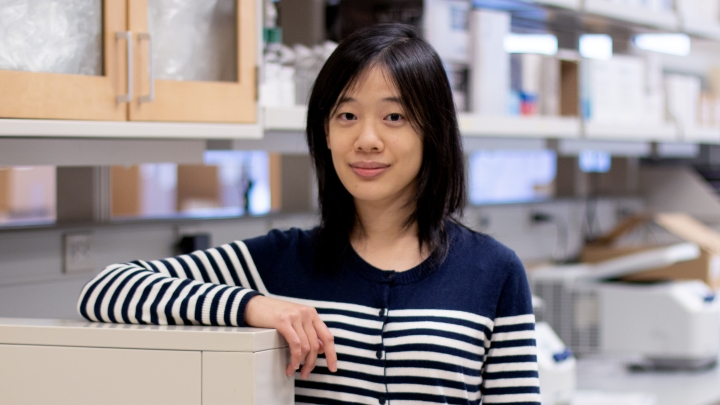
New LSI faculty member aims to develop tools that span discovery science and clinical research
Biomedical engineer Connie Wu, Ph.D., has joined the faculty of the University of Michigan as a research assistant professor at the Life Sciences Institute and an assistant professor of biomedical engineering, representing the LSI’s first joint recruitment with the College of Engineering.
Wu’s new research program at U-M will pursue two separate paths of investigation simultaneously, developing both diagnostic and drug-delivery tools — with a long-term goal of improving detection and treatment of human diseases such as cancer.
Capitalizing on the versatility of RNA, Wu hopes to engineer synthetic RNA macromolecules that can serve as a framework to incorporate a range of new therapeutic modalities, such as immune system activation and gene regulation.
“In nature, RNA is capable of many different functionalities. And because you can tune its sequence and structure, it offers a versatile scaffold to alter or even add new functions in a precisely defined manner,” Wu explains.
The second pillar of Wu’s work will build on her postdoctoral research at the Brigham and Women’s Hospital and the Wyss Institute at Harvard University, where she developed detection platforms that could measure proteins and other biomarkers present even at extremely low levels.
“Now I’m interested in how these tools can be expanded for clinical and basic research applications, to begin to measure a whole host of protein molecules that have been previously inaccessible,” she says.
Her lab at the LSI will explore new technologies that enable the discovery of more sensitive and specific biomarker signatures. In particular, Wu plans to create tools that can better identify proteins and biomarker signatures present in cancers, such as ovarian cancer, and then explore how those technologies can be used for earlier detection of disease.
“The innovative platforms that Dr. Wu is advancing in areas like ultra-sensitive biomolecule detection will have not only clinical applications but also broad utility in basic discovery science,” says LSI Director Roger Cone, Ph.D. “Her addition to the LSI and to the university will accelerate our researchers’ ability to explore and discover new biological pathways that can address a range of scientific problems.”
In addition to her passion for scientific research, Wu is an avid pianist. She has found that music can even help her approaches to lab work, allowing her to exercise another part of her brain and strengthen her creative skills.
“I was attracted to the interdisciplinary environment of the LSI and the opportunity it affords for collaboration,” she says. “And on top of that, U-M’s enormous strength not just in science and engineering, but also in music and the arts, makes it a really exciting and multifaceted place to launch my independent career.”


